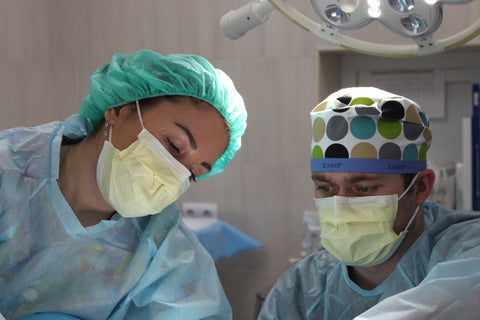on all orders over $99.99!
on all orders over $99.99!

If you or a loved one is about to undergo a mastectomy, you probably have many questions regarding what to expect before, during, and after the surgery. While the exact process of having a mastectomy can vary based on the type of procedure you're having and your surgeon's personal recommendations, the overall process of the surgery tends to be fairly consistent.
Knowing what to anticipate can help you prepare mentally, emotionally, and physically for the procedure and the mastectomy recovery process. Getting all of the facts can reduce uncertainty and allows you to formulate specific questions to ask you doctor. To help you better understand this breast surgery, we've rounded up some of the basic information you need to know going into your mastectomy.
In the weeks before your surgery you will likely have a preoperative appointment with your doctor. During this time, you may have a mammogram, blood tests, and other testing as deemed necessary by your medical staff to make sure you're safely prepared for the upcoming procedure.

Throughout this process, you will also speak with the medical staff about how to prepare for the day of your surgery. Some things your doctor will typically tell you are:
This is also a great time to ask your doctors any questions. In the days leading up to your pre-op appointment, be sure to write down any questions that cross your mind. This is the best way to ensure that you remember them when you speak to your doctor.
When you return from the hospital, you'll be sore and have a limited range of motion, so it's important to get your home ready beforehand.
First, you'll need to make sure you have appropriate clothes to wear after surgery. Some regular recommendations are a comfortable shirt, dress or recovery robe that can either button up the front or be stepped into to wear home after the surgery.

Secondly, you'll want to purchase anything that will help aid in your recovery. This can include things like a recliner chair, comfy pillows, a drain belt for when you shower, or something to keep you entertained while you recover at home.
Lastly, consider what you will do for food during your recovery. Some patients choose to make their favorite meals beforehand and freeze them so they can easily get some tasty nutrition without too much work.
On the day of your surgery, you'll arrive at the hospital and start the pre-op process. This usually involves a few steps:
Most bilateral mastectomy procedures take 2-3 hours. If you have opted to have immediate reconstruction the process will take a little longer to account for these additional actions.

During the surgery, incisions will be made to allow for all of the breast tissue from the overlying skin and chest wall muscle underneath to be removed. All of the tissue from the collarbone down to the ribs, and from the side of the body to the breastbone in the center will be removed.
After all of the breast tissue is removed, any reconstructive measures that have been previously discussed with your doctor, if any, will be performed.
Your surgeon will then insert medical drains on either side of your body to remove fluid from the surgical sites. Most patients will have two drains that operate using suction on either side of the body.
Your surgeon will then close the surgical sites with a combination or sutures, medical glue, and bandages.
After your surgery you'll be moved to a recovery room for the remainder of the night. Most patients are discharged within 24 hours, but some stays can take up to 3 days.
While in the recovery room, the staff will monitor your heart rate, temperature and other vitals while managing your pain by administering pain medication through your IV.
The morning after your procedure, once your anesthesia has worn off, you can expect a few things:
We understand that undergoing such a procedure can be like navigating a whole new world. It's important to remember that your surgeons and medical staff are your number one resources.
Knowing what to expect with a mastectomy can feel safer and more confident in the breast surgery that you are about to undergo. Even if your situation is a little different, it is likely that you will experience most of the steps outlined above. Remember to never hesitate to ask questions you have about the procedure or the results— no matter how silly you think your question may be!